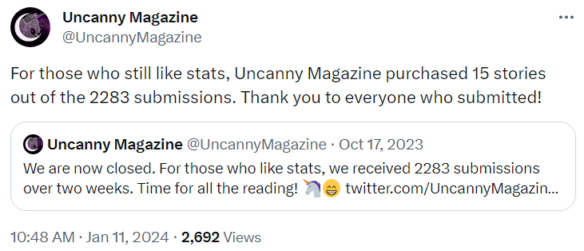(1) HUGO NOMINATIONS CLOSE IN ONE WEEK. Nicholas Whyte, Glasgow 2024 Hugo Administrator and WSFS Division Head reminds members that they have until March 9 to submit nominations for this year’s Hugo Awards. Full information at “Hugo Awards – Nomination Ballot”.
They also are offering Chinese translation for the 2024 Hugo Award nomination process as a courtesy to the Chinese-speaking 2023 Chengdu WSFS members who have nomination rights for the 2024 Hugo Awards.
(2) HWA: MARUYAMA Q&A. The Horror Writers Association continues “Women in Horror Month 2024” in “An Interview with Kate Maruyama”.

Do you make a conscious effort to include female characters and themes in your writing and if so, what do you want to portray?
I write all characters, but I am always trying to get inside women characters in a complex way that blows out the walls of archetypes. The old woman who is complex and funny and real (and swears! All the older women I admire swear), the ingenue aged woman who is brilliant, unpredictable, problem solving, and forward moving, the mother whose entire existence is not mothering, but is a whole person who happens to have kids, the little girl who is smart and weird and does not give a crap about boys.
What has writing horror taught you about the world and yourself?
We all have darkness in us, and if we can get inside it and open up our fears and where they come from, it can help people manage their very real lives.
(3) CHUCK TINGLE ON CAMP DAMASCUS CATEGORY. The Horror Writers Association moved Chuck Tingle’s novel Camp Damascus out of the YA category into the main Novel category. One of the responses earned this callout. (Whoever’s blog this is, I see there also were other comments supportive of Tingle’s book.)
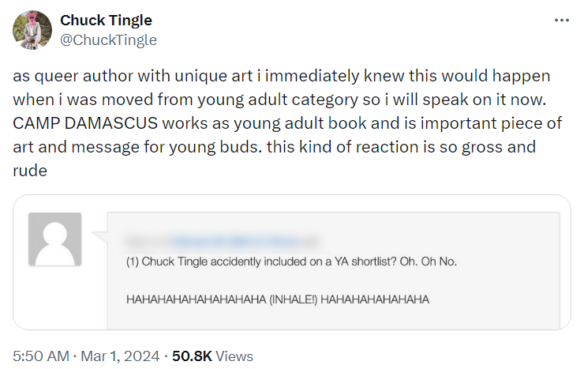
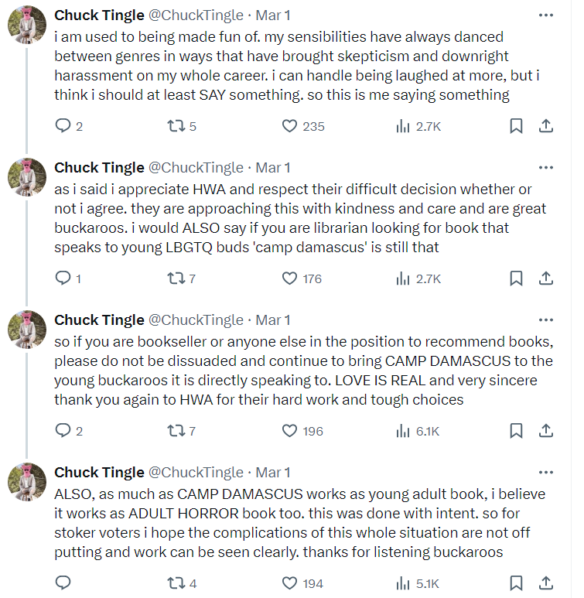
(4) IWÁJÚ. Eddie Louise calls Iwájú on Disney+ — “Amazing science fiction for kids with deep cultural and societal commentary.” See trailer at the link.
“Iwájú” is an original animated series set in a futuristic Lagos, Nigeria. The exciting coming-of-age story follows Tola, a young girl from the wealthy island, and her best friend, Kole, a self-taught tech expert, as they discover the secrets and dangers hidden in their different worlds. Kugali filmmakers—including director Olufikayo Ziki Adeola, production designer Hamid Ibrahim and cultural consultant Toluwalakin Olowofoyeku—take viewers on a unique journey into the world of “Iwájú,” bursting with unique visual elements and technological advancements inspired by the spirit of Lagos. The series is produced by Disney Animation’s Christina Chen with a screenplay by Adeola and Halima Hudson. “Iwájú” features the voices of Simisola Gbadamosi, Dayo Okeniyi, Femi Branch, Siji Soetan and Weruche Opia.
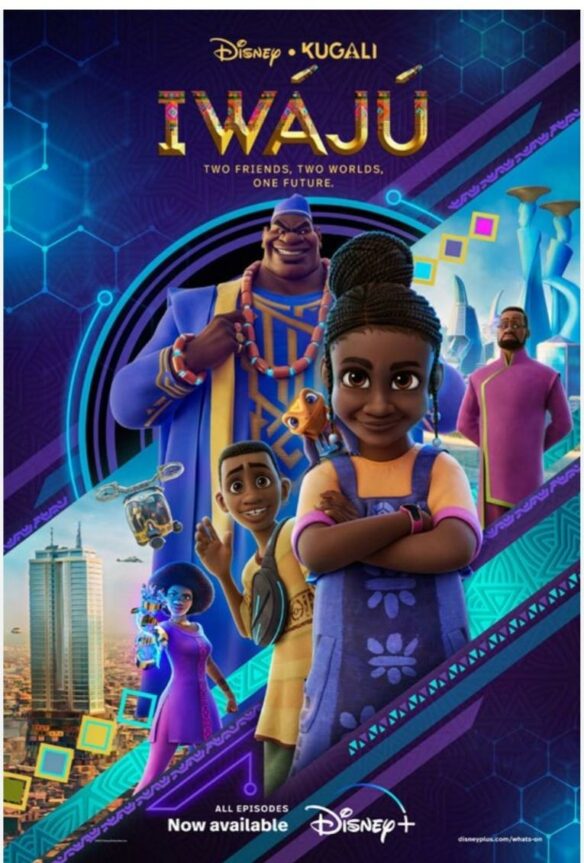
(5) LIKE SAND THROUGH AN HOURGLASS. Maya St. Clair finds what time has done to the first Dune movie – not that a lot of time needed to have passed before the results were known: “Make Sci-Fi Cringe Again (Duneposting 1)”.
The other night, a friend and I went to an anniversary screening of David Lynch’s 1984 Dune. Its manmade horrors were consumed in the way God intended: on a towering screen, with a printout of the infamous Dune Terminology sheet balanced in my lap, as I inhaled a bucket of curly fries agleam with twice their weight in grease. Visually, Dune is an orgy of delights: a dense mannerist universe filled with gilt and wires and inbred animals/people. The voiceovers are camp, the editing ridiculous, the hairdos lofty and aggressive (Aquanet — like spice — must flow). Around the midpoint of the movie — when Sting steps out of a sauna in a codpiece —most people had come to the unspoken understanding that it was okay to laugh instead of sitting in respectful, cinephilic silence. The Harkonnen milking machine (i.e. a rat just duct-taped to a cat) brought down the house….
(6) DUNE PT. 2. [Item by SF Concatenation’s Jonathan Cowie.] Front Row on B Beeb Ceeb’s Radio 4 (a.k.a. the Home Service) first third sees a review of Dune Part II.
Now, while I concur (others may disagree) that for all its spectacle Part I was a little ponderous (go in with a medium or large real coffee Americana) it was faithful to the novel and the SFX far better than the Lynch offering… This last is, of course unfair, the Lynch offering came out four decades ago… Yes, just a decade short of half a century and so you’d expect as big an improvement in cinematography as there was between 1984 and films made towards the end of the war (that’s WWII in case you were wondering how old I was).
So, how did the Front Row review go? Well, the first thing that surprised me was that one of the reviewers hates epic ‘sci-fi’. Yes, for some in the arts, SF remains a ghetto genre. (Or perhaps we at SF² Concatenation should swop our book review panel of ardent SF readers to those that loathe genre literature. Perhaps File 770 should be edited by someone outside of fandom? Perhaps Boris Johnson should become Prime Minister…)
Be thrilled. Be amazed. The truth is out there….
You can listen to the first third of the programme here: “Front Row, Dune 2”.

(7) ABOUT THOSE LENSMEN. Steve J. Wright may not be treading new ground in “How the Other Half Lives”, but fascism, John W. Campbell Jr., and the Golden Age have been thoroughly plowed under by the time he’s done.
This is spilling out of a discussion over on File 770 (item 4 on the scroll), which in turn derived partly from Charles Stross’s “We’re Sorry we Created the Torment Nexus”. It also ties in, of course, to the ongoing “was John W. Campbell a fascist?” non-debate (because people who say no are not changing their minds, ever.)
“Fascist”, of course, is one of those terms linguisticians call “snarl words”, where the negative connotations have pretty much obscured the original usage…
…But were Golden Age SF writers in general, and John W. Campbell Jr. in particular, happy with elitism? Oh, you bet they were. The Gernsbackian ideal, as exemplified in Gernsback’s own ridiculous novel Ralph 124C41+, was a homogeneous, rationally-planned society in which government, if it existed at all, was strictly subordinated to the scientific elite – in the eponymous Ralph’s case, the “plus men”, entitled to that + sign on their names, whose unfettered experimentation led to an endless round of fresh discoveries and scientific benefits for the general populace. And you can’t throw a brick in Campbell-era SF without hitting an omni-competent super-science hero with world-transforming insights and the steely determination to push aside bureaucratic meddling and Get Things Done. Campbell himself regarded Astounding as not just a science fiction magazine, but a proving ground for the ideas that would shape the world of tomorrow. And he had plenty of sympathy from SF fans, who were happy to believe that their time would come, and they would be in the vanguard of the new elite. Granted, not many fans took it as far as the rather alarming Claude Degler, but if you said “fans are slans” at any fannish gathering of the times, you would see more than one head nodding in approval….
(8) REFERENCE DIRECTOR! Meanwhile, in Russia: “Alexei Navalny Was Buried to the Terminator 2 Theme Song” — New York Magazine has the story.
…Navalny got in one last laugh at his funeral on Friday. As his coffin was lowered into the ground, the tune playing in the background wasn’t some funeral dirge, but the theme from his favorite movie, Terminator 2: Judgment Day. It was the refrain that plays during the movie’s famous final scene, as Arnold Schwarzenegger’s soulful killer cyborg gives a thumbs-up while he is lowered into a vat of molten steel, sacrificing himself to save the future….
(9) TODAY’S BIRTHDAY.
[Written by Cat Eldridge.]
Born March 2, 1966 — Ann Leckie, 58. So let’s start with Lis Carey talking about her favorite work by our writer this Scroll, Ann Leckie:
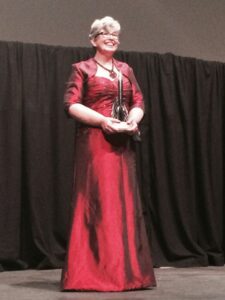
Ann Leckie’s Imperial Radch trilogy, starting with Ancillary Justice in 2013, gives us a culture where biological sex is ignored, and only female pronouns are used. Breq, our protagonist throughout the trilogy, is the only survivor of a ship destroyed by treachery, and she’s the ship’s artificial intelligence, occupying an ancillary body, i.e., a body whose own personality has been erased and replaced with one more useful to the empire, and presenting herself as an officer.
In her quest for revenge, she becomes more and more fully human, and more and more aware of what’s wrong with the empire she serves. We see glimpses of a galaxy beyond the Radch Empire, some of them fascinating.
We’re certainly not given the impression that the Radch are the good guys. In subsequent books and stories, we get looks at the Radch from the outside, and at the other human cultures trying to survive in a galaxy where the Radch are the major human power. It’s a wonderfully complex and layered universe, and it’s well worth exploring.
Ancillary Justice swept the awards field in 2014: a Hugo at Loncon 3, a British Fantasy Award, the Clarke a Kitschie, and a Nebula. The sequel, Ancillary Sword was nominated at Sasquan and won a BSFA Award; the final book in the trilogy, Ancillary Mercy, was a Hugo finalist at MidAmeriCon II. Her next book set in that universe, Provenance, novel garnered a Hugo nomination at Worldcon 76.
Translation State, though also part of the Imperial Radch, is a pretty a stand-alone story. Yes, I liked it a lot. So let’s have Lis set the scene for you again…
It’s set in that universe, on the edge of human space, in a space station where the human polities including the Radch, and several alien polities, attempt to maintain calm and peaceful relations with the Presger, whom no one has ever seen, but who could destroy everyone if they got annoyed.
This is the book where we really get acquainted with the Presger translators, who appear to have been created from humans, but really aren’t, anymore.
It is, I would say, primarily a missing person case more than a murder mystery but it is both. It is a fascinating story.
She’s also written an excellent fantasy novel, The Raven Tower, which I’ve been listening to of late. Adjoa Andoh narrates the audio version. She’s been on Doctor Who numerous times, mostly playing the mother of Martha Jones. She does a stellar performance here.
Leckie has published a baker’s dozen short stories, two set in the Imperial Radch universe. I’ve not read any of them. Who has?
I look forward to seeing what she writes next.
(10) COMICS SECTION.
- Reality Check shows a fan pedant in (unwelcome!) action.
- Close to Home has the most grotesque Pinocchio joke I’ve ever seen.
- Tom Gauld mixes higher math with lower cuisine.
(11) GOOD OMENS VISUALS. Colleen Doran’s Funny Business is back with “Good Omens Peeks” – artwork at the link.
… I don’t know if, you know, getting cancer, going blind, smashing my face in, and generally having a really awful 2023 hasn’t been some weird sort of super-motivation, but I’m working very steady, and I actually think the art has gotten more solid as I go along.
I’m also very far behind schedule, but since the book was so far ahead to start, even though it’s going to be late, it won’t be horribly late. I set some pages aside and was unable to work on them for months, and that distance helped me work through some problems, too.
Anyhow, here’s some of my art in progress. And thanks for all the votes in the ComicScene awards for Good Omens as #1 crowdfund campaign of 2023….
(12) AFTER MIDNIGHT. Bitter Karella is back with the members of The Midnight Society, who are being a trial to Ursula K. Le Guin. Thread starts here.
(13) WAY AFTER MIDNIGHT. In “Seeing ‘Dune 2’ in 70mm Imax at 3:15 a.m. Was an Unforgettable Experience”, Variety’s Ethan Shanfeldfiles a snarky report about the ambiance.
…About 45 minutes into the movie, I thought for sure I was toast. Those gorgeous desert sand dunes reminded me of pillows, and I questioned what life choices I made that led me here, to seat H35. But then I saw a guy nod off two rows ahead of me, and I thought about how annoying it would be to have to see this movie again just to catch the parts I missed. I’m not weak like him, I thought, inhaling my Diet Coke. And, to even my own surprise, I powered through, savoring Paul Atreides’ larger-than-life odyssey all the way until the credits rolled at 6:18 a.m.
On the escalator down, I caught up with the three friends from New Jersey. “What are your plans this morning?” I asked, and they told me they were going to walk west to watch the sunrise over the Hudson. I didn’t have the heart (read: brain cells) to tell them the sun rises in the east.
(14) JUSTWATCH. Here are JustWatch’s charts of the most-viewed streaming movies and TV series of February 2024.
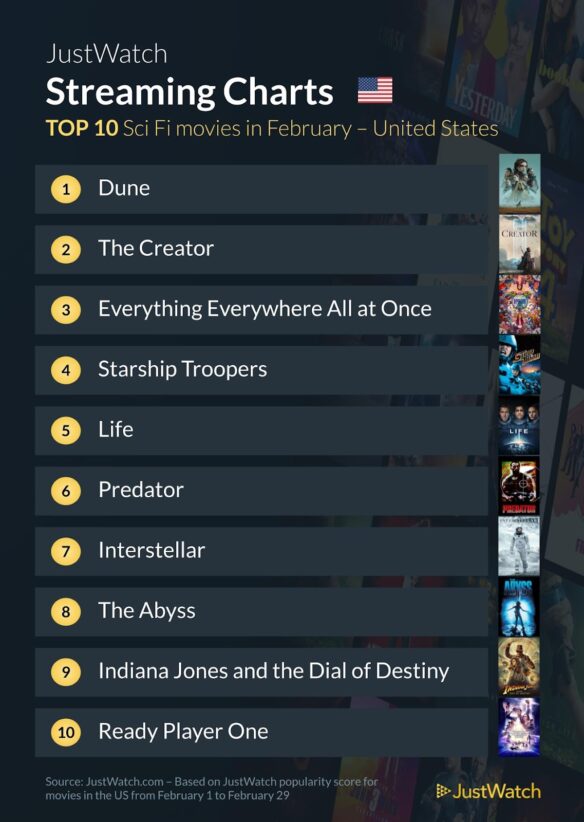
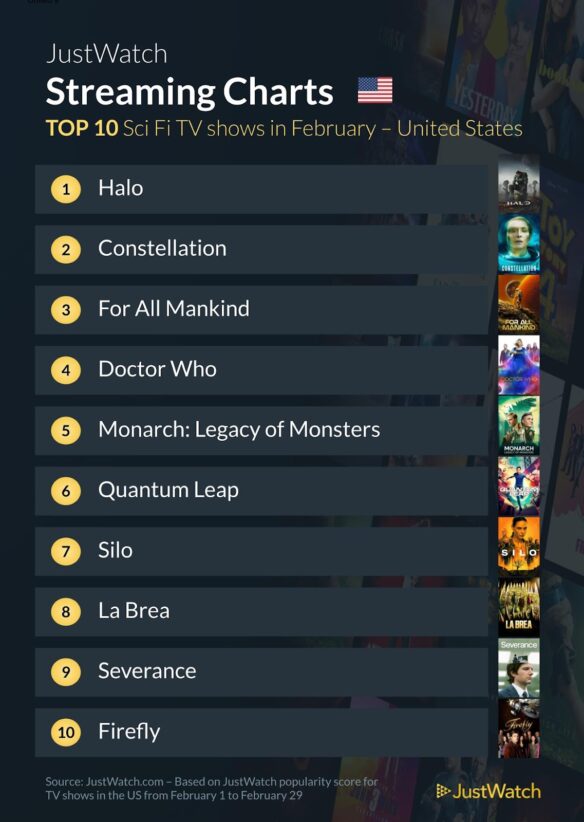
(15) SQUEAK IN DELIGHT. [Item by Bill Higgins.] Good news for all who love helium, Minneapolis in 73, and airships! Let us lift our high-pitched voices in song! “’A dream. It’s perfect’: Helium discovery in northern Minnesota may be biggest ever in North America” on CBS Minnesota.
Scientists and researchers are celebrating what they call a “dream” discovery after an exploratory drill confirmed a high concentration of helium buried deep in Minnesota’s Iron Range.
Thomas Abraham-James, CEO of Pulsar Helium, said the confirmed presence of helium could be one of the most significant such finds in the world.
“There was a lot of screaming, a lot of hugging and high fives. It’s nice to know the efforts all worked out and we pulled it off,” Abraham-James said….
…According to Abraham-James, the helium concentration was measured at 12.4%, which is higher than forecasted and roughly 30 times the industry standard for commercial helium.
(16) 2021 FLASHBACK: STRICTER RATINGS FOR THESE SFF MOVIES. The British Board of Film Classification ratings change to Mary Poppins (see Pixel Scroll 2/26/24 item #9) was just the latest to affect sff films as shown in this 2021 BBC News article: “Rocky and Flash Gordon given tighter age rating”. In 2021 the extended edition of The Lord Of The Rings: The Fellowship Of The Ring has also been moved up to a 12A for its “moderate fantasy violence and threat.”Star Wars: The Empire Strikes Back was moved from Universal to PG.
…Of the 93 complaints the board received last year, 27 were about 1980 space opera film Flash Gordon.
The movie’s 40th anniversary re-release was reclassified up to 12A partly due to the inclusion of “discriminatory stereotypes”.
The BBFC did not say what the stereotypes were. However Flash Gordon’s main villain, Ming the Merciless, was of East Asian appearance but played by Swedish-French actor Max von Sydow….
(17) VIDEO OF THE DAY. [Item by SF Concatenation’s Jonathan Cowie.] Back in the day at school — seems like half a century ago (hang on, it was) — there were a bunch of us whose aim in chemistry was to get the contents of one’s boiling tube to mark the ceiling… We were the back bench bucket chemists! Those were the days. Very much in that spirit, physics Matt O’Dowd asks “What Happens If We Nuke Space?” Come on, Bruce Willis has done it?
EMPs aren’t science fiction. Real militaries are experimenting on real EMP generators, and as Starfish Prime showed us, space nukes can send powerful EMPs to the surface. So what exactly is an EMP, and how dangerous are they?
[Thanks to Cat Eldridge, SF Concatenation’s Jonathan Cowie, Kathy Sullivan, Daniel Dern, Lis Carey, Eddie Louise, JJ, Bill Higgins, Steven French, Mike Kennedy, Andrew Porter, John King Tarpinian, and Chris Barkley for some of these stories. Title credit belongs to File 770 contributing editor of the day Peace Is My Middle Name.]


